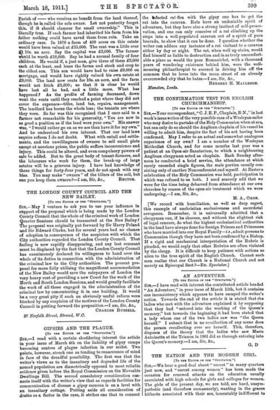THE CONFIRMATION TEST FOR ENGLISH CHURCH MANSHIP.
[To THY EDITOR 01 THY "SPECTATOR."] SIR,—Your correspondent„" C. J. E. P., Chaplain, R.N.," in last week's issue writes of the very possible case of a Wesleyan sailor who may desire to partake of the Holy Communion when at sea, but can only do so should the Anglican chaplain of his vessel be willing to admit him, despite the fact of his not having been confirmed. May I refer to an actual and somewhat analogous experience of my own P I am a member of the Wesleyan Methodist Church, and for some months last year was a patient at an Open-air Sanatorium, to which a neighbouring Anglican clergyman acted as chaplain. Each Sunday after- noon he conducted a brief service, the attendance at which rarely exceeded single figures, the male portion usually con- sisting only of another Nonconformist and myself. At Easter a celebration of the Holy Communion was held, participation in which was refused to us both. I need scarcely add that we were for the time being debarred from attendance at our own churches by reason of the open-air treatment which we were undergoing,—I am, Sir, &c.,
M. A., OxoN.
[We record with humiliation, as well as deep regret, this example of unchristian exclusiveness and sacerdotal arrogance. Remember, it is universally admitted that a clergyman can, if he chooses, and without the slightest risk of legal censure, do what the highest ecclesiastical authorities in the land have always done for foreign Princes and Princesses who have married into our Royal Family—i.e., admit persons to Communion though they have not been confirmed by a Bishop. If a rigid and mechanical interpretation of the Rubric is pleaded, we would reply that other Rubrics are often violated by the clergy. It is difficult to keep patience with actions so alien to the true spirit of the English Church. Cannot such men realise that our Church is a National Church and not merely an Episcopal Sect P—En. Spectator.]










































 Previous page
Previous page